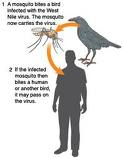BURLINGTON, ON July 30, 2012 Two samples of mosquitoes collected last week in Burlington have tested positive for West Nile virus (WNV), bringing the number of positive batches for Halton Region in 2012 to five. There have been two WNV positive batches in Oakville and one in Milton.
“Our surveillance program helps to show the distribution of West Nile virus positive mosquitoes in Halton Region,” said Dr. Monir Taha, Halton Region Associate Medical Officer of Health. “This season has already shown itself to have earlier than usual West Nile virus activity in mosquitoes”.
August and September are the usual months of highest risk for human illness. All Halton residents are asked to protect themselves from being bitten by mosquitoes and remove standing water where mosquitoes breed.”
Mosquitoes can transmit WNV to humans after becoming infected by feeding on the blood of birds carrying the virus. About 80% of people who become infected with WNV do not experience any illness, while about 20% will develop West Nile fever. Less than 1% will develop inflammation of the brain or its lining, or a type of paralysis. Older adults and people with underlying illnesses should be particularly cautious as they are more likely to develop the illness. The following are steps that residents can take to protect themselves and their families from mosquitoes:
Cover up. Wear light-coloured, long-sleeved shirts and pants with tightly-woven fabric.
Avoid being outdoors from early evening to morning when mosquitoes are most active and likely to bite, as well as at any time in shady, wooded areas.
Reduce mosquito breeding sites around your home by getting rid of all water-filled containers and objects. Change the water in bird baths at least once per week.
Use an approved insect repellent, such as one containing DEET.




















